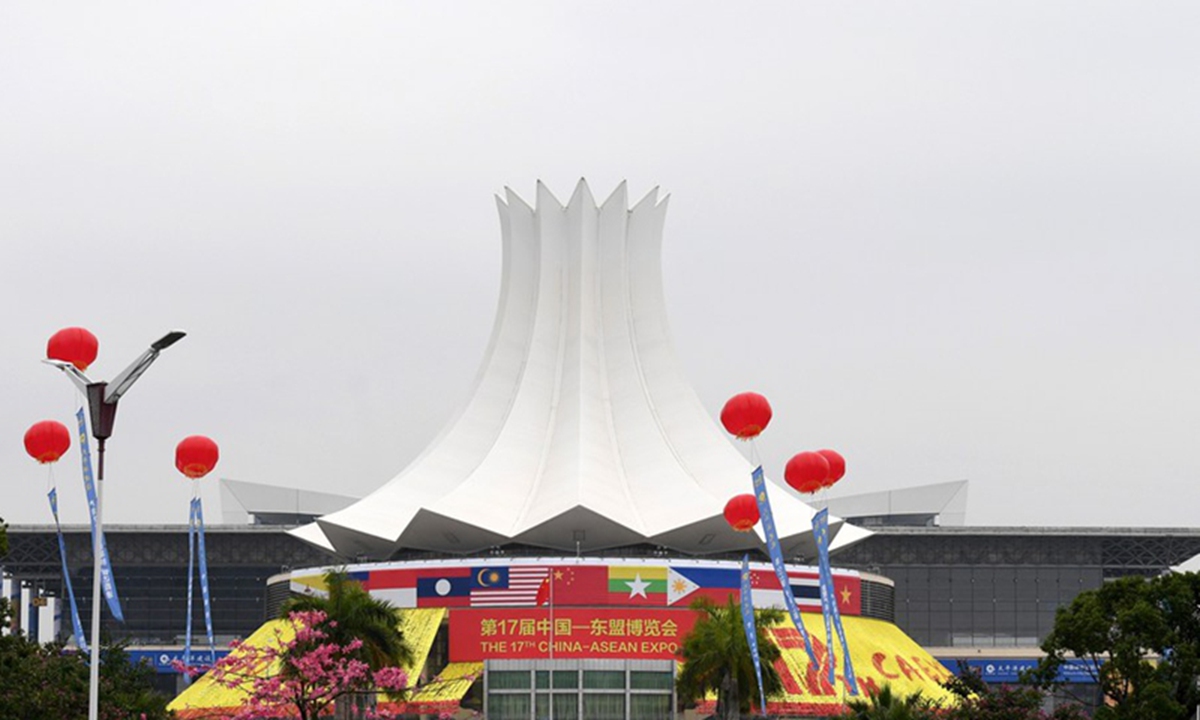Expanding the ‘Nanning Channel,’ China and ASEAN jointly promote regional economic recovery
By Ge Hongliang Source: Global Times Published: 2020/11/30 15:03:44

Nanning International Convention and Exhibition Center in Nanning, South China's Guangxi Zhuang Autonomous Region. Photo: Xinhua
The 17th China-ASEAN Expo and China-ASEAN Business and Investment Summit opened on Friday in Nanning, South China's Guangxi Zhuang Autonomous Region. It comes to light that the expo and summit have been held successfully for 16 sessions consecutively since 2004. The "Nanning channel" had been set up and has become a shining name card of Guangxi and an important platform for China-ASEAN opening-up and cooperation. This channel has expanded a lot recently, and so it is this year that the digital economy effectively upgrades the quality of their cooperation between China and ASEAN by deepening Belt and Road Initiative (BRI) cooperation. It may therefore deepen China-ASEAN cooperation and jointly promote their work toward the regional economic recovery, coping with the shadows in the global economy.In 2020, the China-ASEAN Expo held physical exhibitions and simultaneously built a digital platform and created a "Cloud CAEXPO" to meet the needs of the post-COVID-19 world, and to contribute to "the year of China-ASEAN digital economic cooperation," and provide online negotiation and live marketing services for Chinese and foreign exhibitors this year. At the same time, this China-ASEAN Expo also set up an exhibition area for the Guangdong-Hong Kong-Macao Greater Bay Area, expanding the scale of western New International Land-Sea Trade Corridor, optimizing the financial area, continuing to set up the ASEAN and the international exhibition alone BRI routes, inviting more domestic buyers, and focusing on the capacity of domestic demand.
"Nanning channel" continues to widen, China-ASEAN Expo and summits escalate constantly. It has played a great role in the development and escalation of China-ASEAN FTA, and put forward the high-quality platform for upgrading the quality of China-ASEAN cooperation, and more likely contributes to promoting regional economic recovery jointly with coping with the gloom of the global economy. Today, there are three characteristics with the regional economy shrouded in gloom.
Firstly, the environment development of the global economy is extremely uncertain because of trade protectionism in the west, and as a result, regional economics is facing a strong downward pressure and the overall situation is not optimistic. The world economic outlook released by IMF reported that global economic growth in 2020 will fall sharply from 2.8 percent in 2019 to -4.4 percent in 2020 due to outbreak of conservatism and the COVID-19. As the world's biggest positive growth country, China's economical growth will likely be 1.9 percent. Vietnam is likely to become the only country to have positive growth in the region. Indonesia, Malaysia, the Philippines, Thailand and other southeast Asia's major economies will show varying degrees of decline.
Secondly, there is a window period of transformation of the driving force of the regional economy. Emerging economies such as smart economy and digital economy are playing an increasingly role in the economic development of many countries under the new round of scientific and technological revolution. For example, ASEAN countries widely preferred Industry 4.0.
Thirdly, China and ASEAN countries firmly promote regional multilateralism and free trade, and have also rebounded in trade. In the first ten months of this year, the China-ASEAN trade volume increased by 7 percent, and ASEAN has become China's largest trading partner for the first time.
Thus China and ASEAN countries have determination and are willing to maintain regional multilateral free trade, and to upgrade the quality of their cooperation during the window of the digital and smart economy. The upgrading and broadening of "Nanning channel" will provide platform bonuses as usual.
The author is a senior research fellow of the Charhar Institute in China and the deputy dean of the ASEAN College of Guangxi University for Nationalities. bizopinion@globaltimes.com.cn
Posted in: EXPERT ASSESSMENT